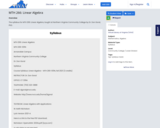
The syllabus for MTH 266: Linear Algebra, taught at Northern Virginia Community College by Dr. Don Goral, PhD.
- Subject:
- Algebra
- Mathematics
- Material Type:
- Syllabus
- Author:
- Virtual Library of Virginia (VIVA)
- Date Added:
- 08/20/2021

The syllabus for MTH 266: Linear Algebra, taught at Northern Virginia Community College by Dr. Don Goral, PhD.
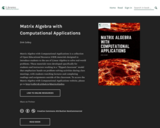
Matrix Algebra with Computational Applications is a collection of Open Educational Resource (OER) materials designed to introduce students to the use of Linear Algebra to solve real-world problems. These materials were developed specifically for students and instructors working in a "flipped classroom" model that emphasizes hands-on problem-solving activities during class meetings, with students watching lectures and completing readings and assignments outside of the classroom. To access the Matrix Algebra with Computational Applications website, please go to http://colbrydi.github.io/MatrixAlgebra
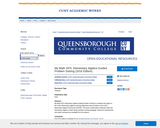
My Math GPS: Elementary Algebra Guided Problem Solving is a textbook that aligns to the CUNY Elementary Algebra Learning Objectives that are tested on the CUNY Elementary Algebra Final Exam (CEAFE). This book contextualizes arithmetic skills into Elementary Algebra content using a problem-solving pedagogy. Classroom assessments and online homework are available from the authors.
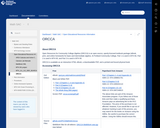
Open Resources for Community College Algebra (ORCCA) is an open-source, openly-licensed textbook package (eBook, print, and online homework) for basic and intermediate algebra. At Portland Community College, Part 1 is used in MTH 60, Part 2 is used in MTH 65, and Part 3 is used in MTH 95.
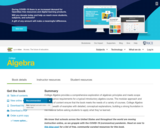
College Algebra 2e provides a comprehensive exploration of algebraic principles and meets scope and sequence requirements for a typical introductory algebra course. The modular approach and richness of content ensure that the book addresses the needs of a variety of courses. College Algebra 2e offers a wealth of examples with detailed, conceptual explanations, building a strong foundation in the material before asking students to apply what they’ve learned.
The College Algebra 2e revision focused on improving relevance and representation as well as mathematical clarity and accuracy. Introductory narratives, examples, and problems were reviewed and revised using a diversity, equity, and inclusion framework. Many contexts, scenarios, and images have been changed to become even more relevant to students’ lives and interests. To maintain our commitment to accuracy and precision, examples, exercises, and solutions were reviewed by multiple faculty experts. All improvement suggestions and errata updates from the first edition were considered and unified across the different formats of the text.
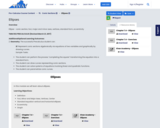
Ellipse - conic section, foci, major and minor axes, vertices, standard form, eccentricityTMM 002 PRECALCULUS (Revised March 21, 2017)AdditionalOptional Learning Outcomes:2. Geometry: The successful Precalculus student can:2f. Represent conic sections algebraically via equations of two variables and graphically by drawing curves.Sample Tasks:The student can perform the process “completing the square” transforming the equation into a standard form.The student can draw curves representing conic sections.The student can solve systems of equations involving linear and quadratic functions.The student can parametrize conic curves.
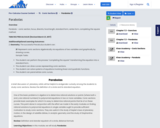
Parabola - conic section, focus, directrix, focal length, standard form, vertex form, completing the square method.TMM 002 PRECALCULUS (Revised March 21, 2017)AdditionalOptional Learning Outcomes:2. Geometry: The successful Precalculus student can:2f. Represent conic sections algebraically via equations of two variables and graphically by drawing curves.Sample Tasks:The student can perform the process “completing the square” transforming the equation into a standard form.The student can draw curves representing conic sections.The student can solve systems of equations involving linear and quadratic functions.The student can parametrize conic curves.
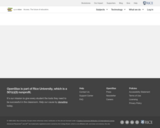
Prealgebra is designed to meet scope and sequence requirements for a one-semester prealgebra course. The book’s organization makes it easy to adapt to a variety of course syllabi. The text introduces the fundamental concepts of algebra while addressing the needs of students with diverse backgrounds and learning styles. Each topic builds upon previously developed material to demonstrate the cohesiveness and structure of mathematics.
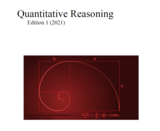
Quantitative Reasoning was designed to align with the objectives of the Virginia CommunityCollege System course MTH 154 Quantitative Reasoning.Table of Contents include:Chapter 1: Ratio and Proportional ReasoningChapter 2: Mathematical ModelingChapter 3: Personal FinanceChapter 4: Validity Studies

A Quick Steep Climb Up Lienar Algebra - and its companion site "allthemath" - are completely-and-forever-free-and-open-source educational materials dedicated to the mathematics that budding computer science practitioners actually need to know.
Table of Contents:
Stretching our legs
Vectors
Linear independence
Matrices
Linear transformations
Matrix mulitplication
Applications
Eigenanalysis
Eigenapplications
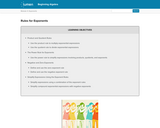
Laws of Exponents
Product and Quotient Rules
The Power rule for Exponents
Negative and Zero Exponents
Simplify Expressions using the Exponent Rules
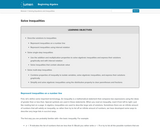
Represent inequalities on a number line.
Represent inequalities using interval notation.
Use the addition and multiplication properties to solve algebraic inequalities and express their solutions graphically and with interval notation.
Solve inequalities that contain absolute values.
Combine properties of inequalities to isolate variables, solve algebraic inequalities, and express their solutions graphically.
Simplify and solve algebraic inequalities using the distributive property to clear parentheses and fractions.

This creation is an all-purpose open source textbook for linear algebra classes of all ilks. Inside you will find a complete and engaging introduction to linear algebra, making it a perfect primary resource for classroom study.
Take a ride through the landscape of linear algebra from basic mechanics through inner product spaces.
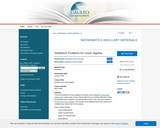
This set of problems for Linear Algebra in the open-source WeBWorK mathematics platform was created under a Round Eleven Mini-Grant for Ancillary Materials Creation. The problems were created for an implementation of the CC-BY Lyrix open textbook A First Course in Linear Algebra. Also included as an additional file are the selected and modified Lyryx Class Notes for the textbook.
Topics covered include:
Linear Independence
Linear Transformations
Matrix of a Transformation
Isomorphisms
Eigenvalues and Eigenvectors
Diagonalization
Orthogonality